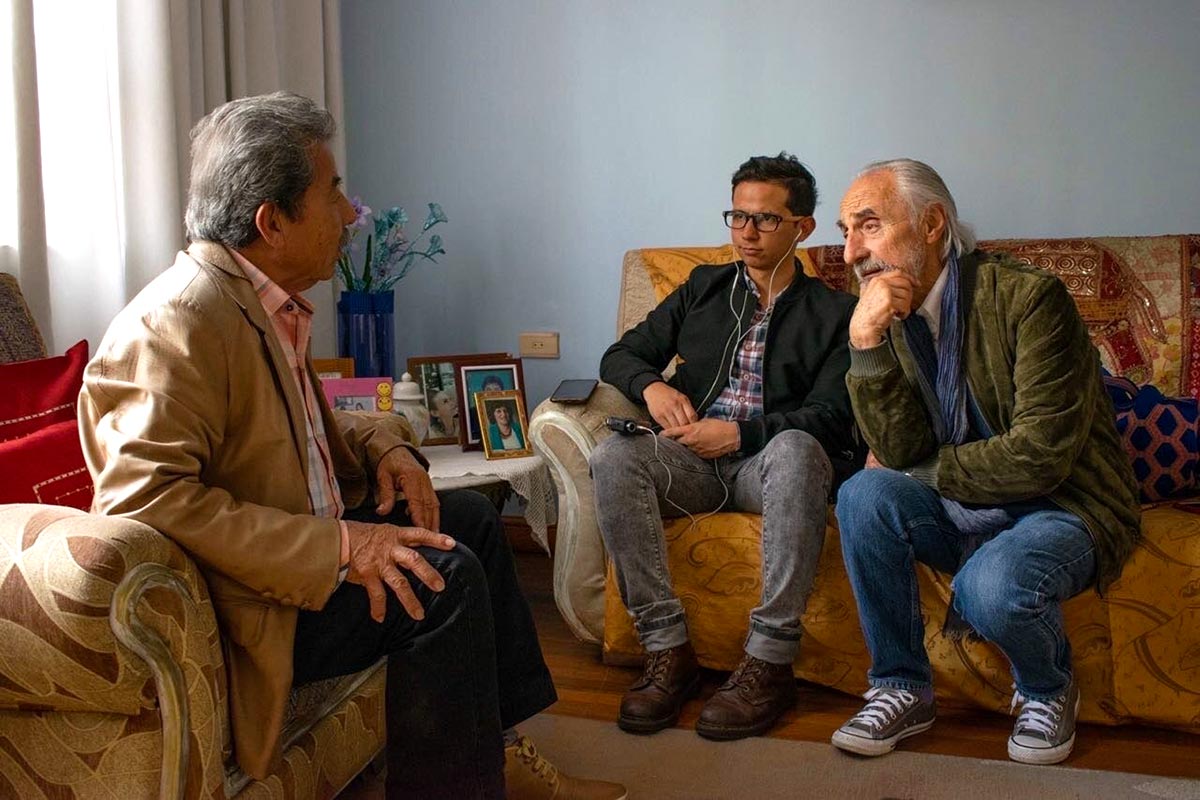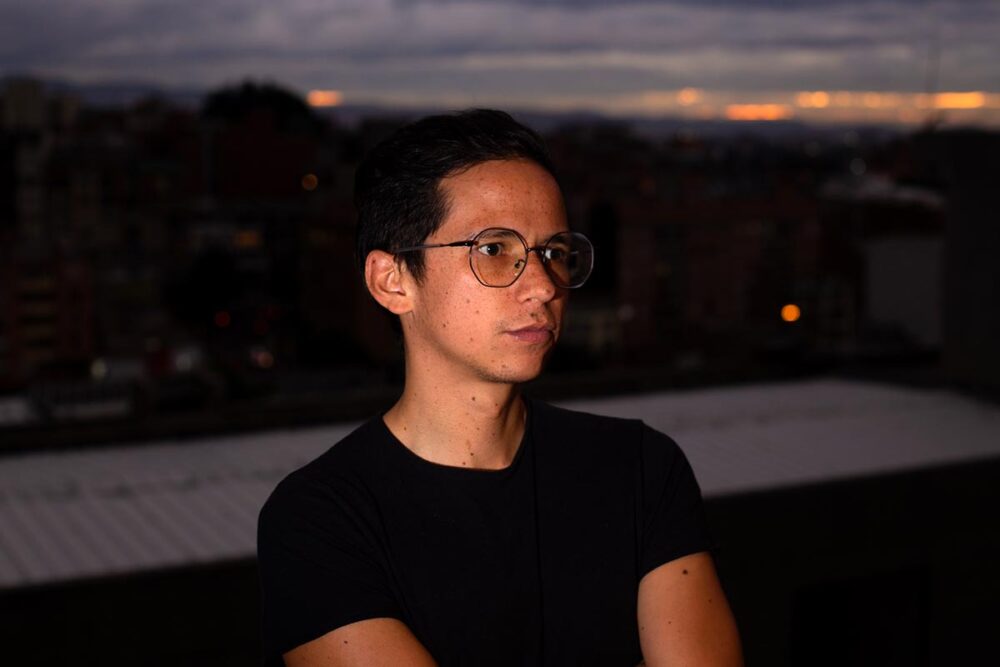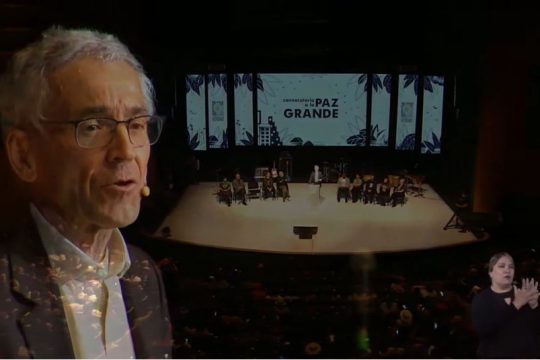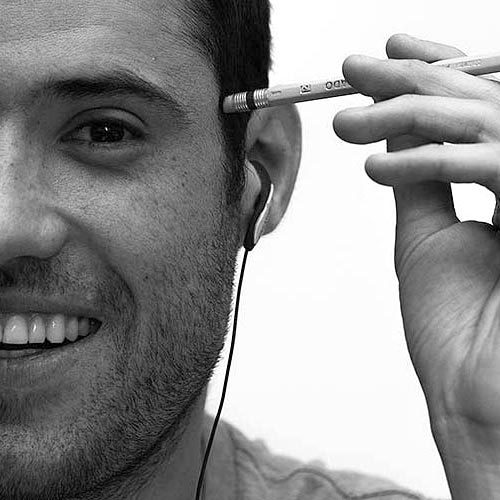Just as the Truth Commission was finalizing the report meant to be its legacy in Colombia’s history, Andrés Celis underwent an unexpected metamorphosis. He went from being one of the hundreds of public officials who, with care and empathy, interviewed thousands of survivors and former combatants to being a victim himself, like those he listened to for hours. During the last thirteen months, Celis has lived with an acute depression, an insomnia that pushed his body to its limits and the loneliness of exile, after two information thefts and a barrage of death threats forced him to leave the country in September 2022.
Celis's case illustrates a dramatic reality for several transitional justice operators in a country which has tried to close its armed conflict by chapters but where dozens of criminal structures fiercely opposed to truth, the empowerment of victims, or both, still survive. His story - and that of at least two Truth Commission colleagues - underscore questions for one of the most innovative transitional models. How could it have teams of psychologists at the service of victims and perpetrators, but not of its own officials? And who protects a dedicated public servant to the transitional justice’s mission once the institution he worked for ceases to exist?
"Feeling drowned with an oxygen mask on"
Celis, a 31-year-old journalist and political scientist, just completed a year away from Colombia, a forced exile that he describes in the blog he has been keeping as “feeling drowned with an oxygen mask on”.
Working as a researcher at the Colombia’s Truth and Reconciliation Commission (TRC) was his dream. It was also the opportunity to bring together his two professions after working for five years at Verdad Abierta, an innovative online media outlet focused on understanding the armed conflict’s dynamics. He also worked at Rutas del Conflicto, another news outlet born from a mobile application that educated Colombians about the tragedies that occurred in each part of the country where they passed through.
That’s why, when a United Nations agency opened a call for applications to be part of the TRC’s preparation team, he didn’t hesitate. "With a group of friends, we thought a Truth Commission was the moment we’d be able to contribute a grain of sand to everything that had already been investigated before," he confides to Justice Info by videoconference from a European country that granted him a humanitarian visa.
With the TRC underway, he joined a team of six, dedicated to conducting in-depth interviews with key figures. They weren’t necessarily high profile, but exceptional political or military witnesses of the decades of violence in the country and of the mechanisms that allowed it to be recycled over and over. If the interviewee was in jail, they could take months to complete.
Celis was assigned the former paramilitaries and drug traffickers. He worked hand in hand with Commissioner Alejandro Valencia Villa, a human rights lawyer who had worked in several Latin American truth commissions. It was a joyful period for him. "I lived very happily for a long time working there," he recalls.
“Operation lemon” over a drug baron
Celis's ordeal began just after his last visit to one of these interviewees. Over 13 sessions he’d met with Dairo Usuga, better known as 'Otoniel,' a recently arrested commander of the Gulf Clan. The TRC considered that he might know important truths about the armed conflict because, before leading of one of the largest drug trafficking rings in the country, he was a member of the Maoist guerrilla group the People's Liberation Army (EPL) and the extreme right-wing paramilitary United Self-Defense Forces of Colombia (AUC). He was emblematic of wartime defections, or what Colombians term 'shirt-switching' between armed groups.
It was, in Celis's words, an “interrupted interview”. In a dozen visits to his heavily guarded cell in Bogota, they met plenty of inconveniences. Once they were told they couldn’t record, or that pens were forbidden. Another time they were told Valencia wasn’t registered in the National Police divisions’ database and, therefore, couldn’t go in. In one session, the recorder abruptly stopped twice and in another it left only white noise. Obstacles that, added together, meant they had less quality time with Usuga. They felt, Celis says, that they were being given what he calls "operation lemon": being squeezed until they gave up.
During the last session, on February 17 2022, a group of policemen suddenly entered while they were talking and instructed them to evacuate the room for security reasons. The Police warned about a flight risk. It was the last time they saw Usuga. Two months later, Ivan Duque’s government extradited him to the United States, where he was convicted and now serves a 45-year sentence. As with other Colombian kingpins, he was convicted on drug charges and not on human rights violations, and the possibility of persuading him to make contributions to truth vanished.

Flat visited and recordings stolen
Two days after his last interview with Otoniel, Celis appeared in the national news. That morning, his apartment in Bogota’s Teusaquillo neighbourhood looked as if a hurricane had blown through. The two tape recorders safekeeping the conversation with the Gulf Clan boss had disappeared, as well as his personal computer, a work folder and two cell phones.
But the policemen who inspected the apartment that morning concluded that this was a “street dweller motive”. Their theory was that it had been an opportunistic petty thief, even though only work items had been stolen. This hypothesis did not convince Celis, especially since neither he nor his roommate felt the intruder's presence even though they were asleep a few meters away. He believes that they could have been drugged as a prelude to the theft.
On a second inspection, Celis noticed that several books were also missing: two photo anthologies by Federico Ríos and Stephen Ferry, two of the country's leading conflict photojournalists, as well as a series of pamphlets on the National Liberation Army (ELN) guerrillas and the Bolivarian movement that he’d collected as part of his reporting and that - Andrés believes today - the thief may have deemed useful to undermine his credibility.
His scepticism multiplied when, on April 7, 2022 the Attorney General's Office summoned Andrés and Valencia to a meeting. That day, prosecutors showed them videos from CCTV cameras. They showed a man in a black jacket and cap folded down to cover his face, walking straight to his building and athletically climbing up to the second floor window. He stayed in the flat for an hour and 32 minutes, until he jumped out and boarded a cab with an illegible license plate. But the authorities insisted on their street dweller hypothesis. Valencia, upset, told them to come up with something more believable. The prosecutors promised that they’d continue their investigation and that the missing equipment would appear within 24 hours.
Celis didn’t hear from the Attorney General’s Office in the year and a half that followed. The last he knew, from an email he received in July of this year, is that several of the inquiries on threats were closed due to the "impossibility of finding or establishing the active subject" and that the one for robbery in his house remained "inactive".
His case isn’t the only one of threats against transitional justice operators. The most visible was perhaps that of Special Jurisdiction for Peace (JEP) justice Alejandro Ramelli and his law clerk Hugo Escobar, who were threatened in May 2023 - presumably by the Gulf Clan - while investigating extrajudicial executions in the Dabeiba cemetery. They were “digging up a past that is already buried,” said the text message they received.
Celis’s “Colombian suitcase”
Shortly after the robbery, Celis began receiving anonymous calls implying there was a price on his life. They were short conversations in which the caller presented himself as a hitman or a member of some paramilitary group - sometimes with implausible titles such as "the commander of the main block" - but which sought to show that he was being followed exhaustively, with exact addresses and times, descriptions of his clothes or his companions.
Similar messages were conveyed via whatsapp, emails and Twitter. In total, he received four rounds of calls over a year and a half, including several from the Netherlands and at least four the week the TRC released its final report. A second robbery happened in March 2022, when two armed men accosted him in Santa Marta - the Caribbean city where he’d taken temporary refuge - demanding that he hand over "his mobile phones".
The physical and emotional exhaustion led him to request a humanitarian visa and leave towards exile. Another tragic irony, given that one of the innovations of the Colombian TRC was to document the plight of those forced into exile, a diaspora that Commissioner Carlos Martín Beristain - who led that work - estimated at a million persons.
In his second refuge, among migrants and asylum seekers who’d mostly reached Europe by crossing the Strait of Gibraltar, Celis relived the testimonies of a group of Colombian exiles whom he had interviewed at a TRC hearing he’d been asked to support. From the uncertainty of not having a support network, a salary or a space of one’s own to the nostalgia for his food, language or climate. “What I heard from them I could now tell,” he says. Celis suddenly felt that this chapter of the TRC's report - titled ‘A Colombian Suitcase’ - condensed his current fate.
“I had a thing here in my chest for years. I called it my homeland pain, because it was something that didn’t allow me to breathe,” says a passage that he transcribed in his blog.
When transitional justice closes its doors
The doctor and psychologist who led that TRC work on exile, with whom Celis never worked, became his greatest protector and moral support. So did two fellow researchers and journalists, Ivonne Rodríguez and Tatiana Navarrete, and criminologist Camilo Umaña, who led the investigation into victimisation of the judiciary and is currently deputy minister for criminal policy. Father Francisco de Roux, who chaired the TRC, hosted Celis for a month at the Jesuit seminary and helped him obtain a humanitarian visa.
But, beyond three sessions with one psychologist and long friendly conversations with pychosocial team leader Dora Lancheros, Celis felt that there was no institutional decision to accompany him, neither from the TRC nor from most of its senior officials, including two commissioners who'd been his bosses. When in March 2022, he asked those in charge of administration, human talent and security at the TRC if there was a route planned to accompany researchers after the final report, they responded that they were considering it.
On June 8, three weeks before the report’s launching, Celis wrote a letter to the TRC warning that the promised route didn’t exist. He asked three questions: “What will happen after the publication of the final report with those of us who presented this type of [security] inconveniences? Has any type of contingency plan been thought of in case any eventuality occurs to any former official of the institution? What will happen with those of us who, on behalf of the TRC, spoke face to face with various armed actors, legal and illegal, and former state agents?”
Celis wasn’t the only TRC official who had to leave Colombia. At least one other person, who asked not to be named, was forced to wander around several universities in another continent for almost a year – “suitcase over my shoulder” - after receiving intimidating messages for two years, including upwards of 80 calls from different numbers in one day. Father de Roux helped this official leave the country for a period after the report was launched.
Another former TRC investigator, who also asked not to be named because she works for an international agency, relayed us three episodes of harassment. Once, a cloaked man took pictures of her with a telephoto lens while she ate lunch and then ran away. Then, at the peak of her investigation, her phone calls began to present voice distortions and once an outside conversation in English crept in. Finally, a car visibly followed her as she walked with her daughter. “Of the three complaints I filed [with the TRC’s security team], I never got a response,” she says.
Researchers’ mental health not supported
In his letter, Celis touched upon another key issue: the researchers’ mental and emotional health, or what he called "the human costs of the genuine and disciplined work on the final report". Neither he nor his colleague received psychosocial support from the Commission. The psychologist Celis has seen for the past two years, with whom he’s even talked every day, he pays for out of his own pocket.
When a group of transcribers, overwhelmed by the cruelty of the testimonies they worked with, asked for accompaniment the institution provided it. But it didn’t extend the offer to the rest of its employees, who also heard heart-wrenching stories every day. "The psychosocial team was in charge of accompanying hearings, victims and also perpetrators, but not inwardly," says Celis. "We had our support networks, to take care of each other," says his colleague, "but we did have a widespread need for it."
Justice Info reached out to Father de Roux to ask about these cases and the psychosocial care available to TRC officials, but he did not respond to messages left on his phone.
In late August, Colombia’s TRC closed its doors and shortly thereafter was liquidated as a public entity.
“I had to repeat to myself who I am”
With exile and its longings also came sensations that Celis had never experienced before. The cold, damp autumn brought back an asthma attack the likes of which he hadn’t suffered since he was twelve years old. Anxiety has left him with a continuous, painful bruxism. An insomnia crisis triggered what doctors diagnosed as a major depression.
He could only sleep one, two or maximum three hours per night. Sleep deprivation had a domino effect on his body, affecting his mood, motor skills and central nervous system. A single block on foot left him exhausted. He lost interest in keeping his room tidy or brushing his teeth. A local psychiatrist prescribed a treatment consisting of a hypnotic and an anxiolytic pill, but his body reacted terribly to the chemical cocktail. He suffered what doctors call depersonalization, a disorder where he felt outside his body. "I had to repeat to myself who I am, what I am doing here, who the person next to me is," he recalls.
In those extreme circumstances, what comforts one most can also turn against you. "I'm a massive music lover and there came a time when I couldn't stand it. My refuge became torture," Celis says. He didn't understand why his beloved Pink Floyd’s 'Hey you' or post-punk bands like Bestiario hurt him, until he read a book by British neurologist Oliver Sacks and understood that, when a person is in an altered state, memories can hurt. A song could reinforce negative thoughts, a pathological repetition that Sacks calls 'brain worms' and an image that Andres adopted in his writing. He gave up music for a while.
The "infinite loop of pain," in Andrés's words, worsened. Thoughts of suicide multiplied. Seeing no clear future, one day he tried to die. Immediately his brother arrived from another continent to accompany him. He was able to see his parents later on. His Colombian therapist changed the therapy he was receiving and focused on one that could regulate his sleep. "When I started sleeping, I began to balance myself," he says.
He finished his master's thesis in sociology of law, precisely on the Gulf Clan he studied for years. He applied for a doctorate in human rights and was just admitted. He wants to direct it towards continuing his research and writing a book on the criminal structure led by Otoniel.
As Celis says in his most visceral blog entry, "they didn't win. Here I am".








